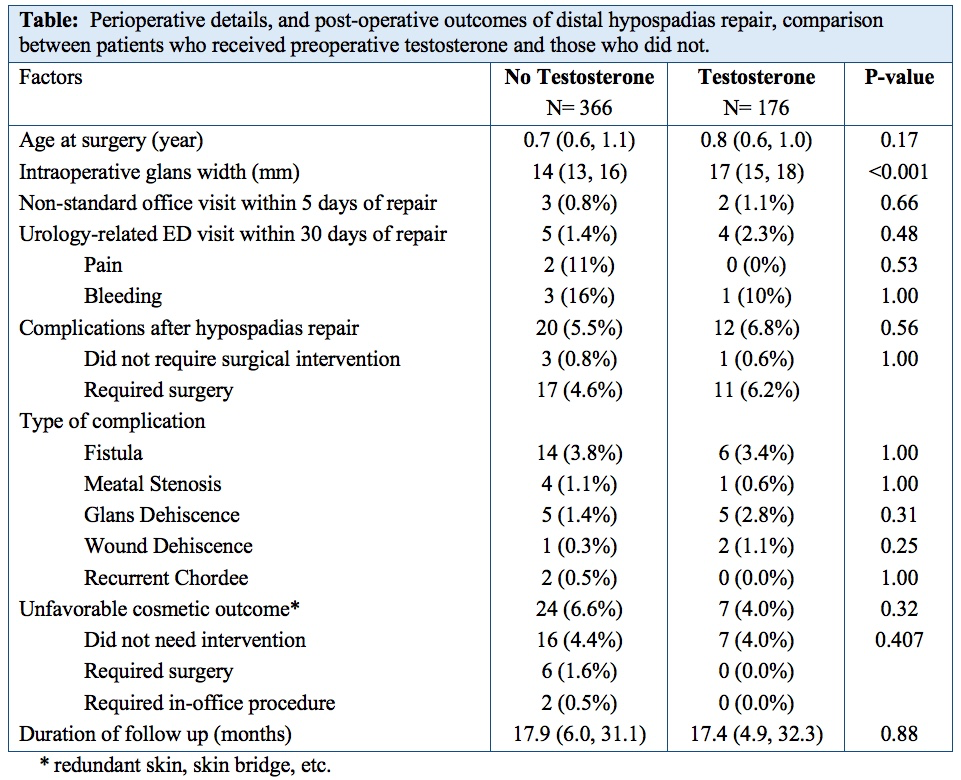Back
Poster, Podium & Video Sessions
Moderated Poster
MP08: Pediatric Urology: Penis & Scrotum
MP08-04: Use of Pre-operative Testosterone Prior to Distal Hypospadias Repair Does Not Increase Post-Operative Complications
Friday, May 13, 2022
10:30 AM – 11:45 AM
Location: Room 225
Sahar Eftekharzadeh*, Sameer Mittal, Nathan Hyacinthe, Dana A. Weiss, Jason Van Batavia, Aseem R. Shukla, Arun K. Srinivasan, Thomas F. Kolon, Stephen A. Zderic, Douglas A. Canning, Mark R. Zaontz, Christopher J. Long, Philadelphia, PA

Sahar Eftekharzadeh, MD,MPH
Visiting researcher/ Incoming urology resident
The Children's Hospital of Philadelphia
Poster Presenter(s)
Introduction: Pre-operative Testosterone (T) administration prior to hypospadias repair with the goal of improving surgical outcomes is a common practice among pediatric urologists, however, there is some literature suggesting an increase in complications. We hypothesized that T administration prior to repair of distal hypospadias would not result in higher rates of complications or unplanned encounters.
Methods: A single-institution prospective database of hypospadias patients was queried to identify primary single-stage distal hypospadias repairs from 2016 to 2021. Patients with known T administration status and documented intraoperative measurement of glans width (GW) were included.
Our primary goal was to compare complication rates, unfavorable cosmetic outcomes (i.e. redundant skin, skin bridge, etc.), unplanned encounters (i.e. unplanned office visits, ED visits and readmissions), and reoperation rates between patients who received T vs those who did not. Multivariable logistic regression analysis was used to determine role of T administration in incidence of unfavorable outcomes, unplanned encounters, and reoperation.
Results: Of 1545 hypospadias repairs, 542 (35%) patients with a median age of 0.7 years (IQR: 0.6, 1.0) at surgery and a median follow-up of 18 months (IQR: 6, 32) were included in this study. 176/542 (33%) patients received T prior to surgery [Table].
There was no significant difference in surgical outcomes, cosmetic outcomes, unplanned encounters, and 30-day complications between the two groups.
Multivariate analysis demonstrated that when controlled for race, ethnicity, and age at surgery, incidence of unplanned encounters and unfavorable outcomes were not affected by administration of T (p>0.05).
Additionally, Multivariate analysis showed that Black and African-American patients were at higher risk for unplanned encounters compared to others (OR: 3.3, 95%CI: 1.4 - 7.6, p<0.01).
Conclusions: Pre-operative T administration results in a significant increase in penile glans width. For single-stage repair of distal hypospadias, T is safe and does not increase the rate of surgical complication development.
Source of Funding: None.

Methods: A single-institution prospective database of hypospadias patients was queried to identify primary single-stage distal hypospadias repairs from 2016 to 2021. Patients with known T administration status and documented intraoperative measurement of glans width (GW) were included.
Our primary goal was to compare complication rates, unfavorable cosmetic outcomes (i.e. redundant skin, skin bridge, etc.), unplanned encounters (i.e. unplanned office visits, ED visits and readmissions), and reoperation rates between patients who received T vs those who did not. Multivariable logistic regression analysis was used to determine role of T administration in incidence of unfavorable outcomes, unplanned encounters, and reoperation.
Results: Of 1545 hypospadias repairs, 542 (35%) patients with a median age of 0.7 years (IQR: 0.6, 1.0) at surgery and a median follow-up of 18 months (IQR: 6, 32) were included in this study. 176/542 (33%) patients received T prior to surgery [Table].
There was no significant difference in surgical outcomes, cosmetic outcomes, unplanned encounters, and 30-day complications between the two groups.
Multivariate analysis demonstrated that when controlled for race, ethnicity, and age at surgery, incidence of unplanned encounters and unfavorable outcomes were not affected by administration of T (p>0.05).
Additionally, Multivariate analysis showed that Black and African-American patients were at higher risk for unplanned encounters compared to others (OR: 3.3, 95%CI: 1.4 - 7.6, p<0.01).
Conclusions: Pre-operative T administration results in a significant increase in penile glans width. For single-stage repair of distal hypospadias, T is safe and does not increase the rate of surgical complication development.
Source of Funding: None.


.jpg)
.jpg)